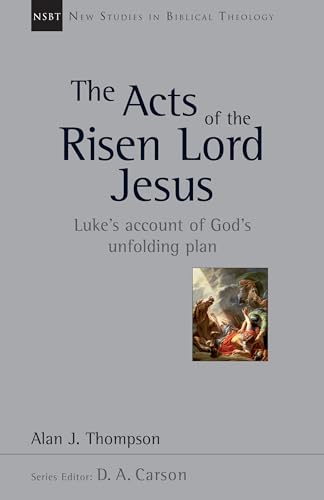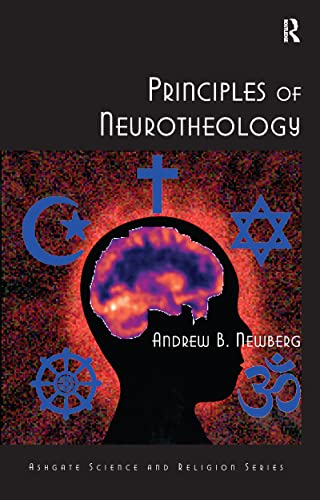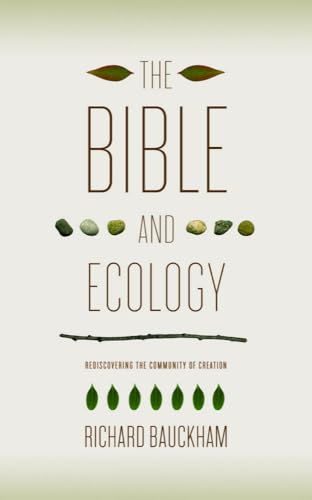The Acts of the Risen Lord Jesus: Luke’s Account of God’s Unfolding Plan
Written by Alan J. Thompson Reviewed By Thomas R. SchreinerAlan Thompson's book on the theology of Acts is part of the New Studies in Biblical Theology series edited by Don Carson. It is a worthy addition to the series, representing biblical theology at its best. Thompson does not attempt to write an exhaustive study of the theology of Acts but focuses on themes that accord with Luke's own interests, writing in a lucid and engaging manner. Hence, this would be an ideal volume for any study on Acts or for a course on biblical theology.
According to Thompson, the book of Acts unfolds the fulfillment of God's saving purposes. Specifically, the sovereignty and kingdom of God take center stage in Acts. Thompson maintains that Acts is a book about the risen Christ, who exercises his reign at the right hand of the Father. Jesus is returning to complete God's sovereign purposes, but in the interval between the inauguration and consummation of the kingdom, he rules from heaven. The church faces suffering in the interval between the already and not-yet, but the word of the gospel continues to spread despite and even through such suffering. Thompson provides his own outline of Acts, modifying the idea that the summary statements of Acts (6:7; 9:31; 12:24; 16:5; 19:20) function as the major dividing points. He particularly questions finding a major dividing point in 6:7. But against Thompson, the Stephen speech is placed after the spread of the gospel in Jerusalem since it functions as the catalyst, even though it takes place in Jerusalem, for the progress of the gospel outside Jerusalem (8:4).
Acts emphasizes particularly the resurrection of Jesus Christ. Thompson rightly locates Ezek 37 as a key OT text for the hope of the resurrection. Israel is promised that she will return from exile, be cleansed from sin, receive the Spirit, be united as a nation, strengthened to keep God's commands, and live under the reign of a new David. Similar prophecies in some respects are found in Isa 26 and Dan 12. The resurrection of Jesus Christ, which Luke features as a historical reality, signifies the fulfillment of Israel's hope. The promises of the age to come have been realized in the resurrection of Jesus Christ. Jesus pours out the Spirit because he is risen and exalted (Acts 2:33). As the resurrected one he grants forgiveness and repentance to Israel (Acts 5:30-31). Thompson rightly argues that Luke has a theology of atonement against those who think that atonement is diminished in Luke and Acts. Still, the resurrection takes center stage, for it certifies the efficacy of Jesus' death and the fulfillment of God's promises.
Thompson argues that Jesus answers the disciples' question in Acts 1:6. The gift of the Spirit both in Acts and the OT is closely connected to the coming of the kingdom, and hence the reference to the Spirit doesn't veer off onto another topic. That Jesus answered the query of the disciples is also supported by the reference to Israel in Jesus' reply. The witness in Jerusalem, Judea, and Samaria suggests that the promise of Israel's unification per Ezek 37 will be fulfilled. The references to the Spirit, witnesses, and the ends of the earth also pick up on prophecies from Isaiah (32:15; 43:12; 49:6). Since the proclamation will reach the ends of the earth, the restoration will transcend Israel and also include Gentiles in accord with Isaianic prophecy. The fulfillment theme is borne out by the day of Pentecost, for the arrival of Jews from all over the world in Jerusalem suggests that the promises of return from exile find their fulfillment here.The focus on the whole house of Israel in Acts 2 reverberates with Ezek 37, suggesting that the unification of God's people is becoming a reality (pp. 110-12). So too, the inclusion of Samaria (Acts 1:8; 8:4-25) also signals the unification of the northern and southern kingdom. I found Thompson's reflections here to be quite stimulating, for he ties Acts to OT texts in illuminating and persuasive ways.
The gift of the Holy Spirit fulfills OT promises (e.g., Isa 32:15; Joel 2:28). As Acts 2:33 indicates, the risen Lord pours out the Spirit on his people, showing that the Spirit's work is a consequence of Jesus' ministry, death, resurrection, and exaltation. The Spirit empowers the people of God to speak God's word and bear witness to the gospel. In contrast to the OT, now all of God's people prophesy, fulfilling Num 11:29. Thompson rightly argues that the Spirit does not only empower for ministry but also transforms God's people. The giving of the Spirit to Jews (Acts 2), Samaritans (ch. 8), Gentiles (chs. 10-11), and the Ephesian twelve (ch. 19) accents the oneness of the people of God.
Thompson insightfully links Acts 3-5 with chapters 6-7 in explicating the theology of the temple in Acts. He maintains that the Jerusalem temple points to Jesus and is replaced now that Jesus has come. Since Jesus is the risen Lord and the reigning Davidic king, the last days promised in Isa 2:1-4 have arrived. The healing of the lame man in the temple signifies the removal of temple boundaries, for the praise and leaping of the lame one fulfills the prophecy of Isa 35:6. Thompson has a short section here on the Christology of Acts. Perhaps more detail on Christology would have been helpful, and yet one cannot complain given the freshness of Thompson's work. He argues that Acts 4-5 portray the end of the old temple leadership. Jesus is now the cornerstone of the temple, and the apostles are the leaders and teachers of God's people in contrast to the leaders in the temple. Acts 3-5 prepares us for Acts 6-7, where Stephen defends himself from the OT, arguing that the temple is both relativized and replaced now that Jesus has come. Stephen does not criticize the building of the temple per se as some have said, but Acts 7:55-56 shows that God's glory and presence are now found in Jesus, pointing to the end of the temple.
Thompson also maintains that the law is no longer the direct authority for God's people. Due to the progress of redemptive history, the law is now fulfilled in Jesus (24:14; 25:8, 10; 26:22; 28:17), for he fulfills the hope of the Jews (23:6; 24:15; 26:6-7). The teaching of apostles, rather than the OT law, now functions as the authority for the people of God. Some have argued that the law continues to be binding for the church, but the episode with Cornelius clearly shows that food laws are no longer required (10:1-11:18). In the same way, the stipulation that one must be circumcised to be saved is rejected (ch. 15). Salvation is by grace through faith, not via the law. Interpreting the four requirements in the decree has always been controversial. Thompson is persuaded by Witherington's reading. The stipulations of the decree are not just temporary restrictions but are considered to be necessary and summarize the teaching of the apostles and elders in Jerusalem. Hence, according to Thompson, they refer to practices related to pagan idolatry. Acts 15 teaches, then, that the law is not required for salvation but new converts must avoid idolatry. Such a reading is certainly attractive and represents a possible reading of the text. In any case, Paul's circumcision of Timothy (16:3) and conformity to the Jewish law (ch. 21) does not contradict the message that believers are free from the law. Luke shows that Paul was not opposed to Jews keeping the law for cultural reasons and that Paul himself was sensitive for the sake of mission to the cultural situation that he occupied.
We can be grateful to Thompson for a profound, convincing, and delightful work on the theology of Acts. It is a much needed work, for there are few theologies of Acts written, and I can't think of one that is more accessible and faithful.
Thomas R. Schreiner
Tom Schreiner is James Buchanan Harrison professor of New Testament interpretation at The Southern Baptist Theological Seminary in Louisville, Kentucky.
Other Articles in this Issue
Evaluating a new English translation of the Bible can be extremely difficult...
In the November 2009 edition of Themelios, Dane C...
Jonathan Edwards (1703-1758) is remembered today as a saint, scholar, preacher, pastor, metaphysician, revival leader, theologian, Calvinist—the list goes on...
Almost two decades ago I wrote an essay titled " When Is Spirituality Spiritual? Reflections on Some Problems of Definition ...
He was the youngest son of elderly parents. His childhood was secluded and unhappy, which might in some measure account for his lifelong melancholy...







